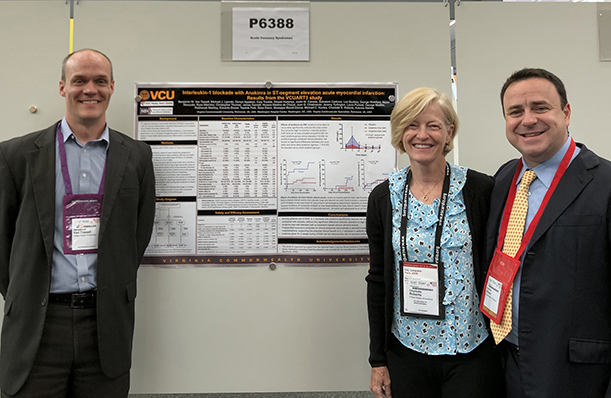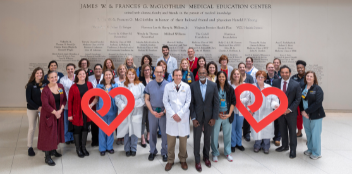Decades-long determination
VCUART3 proves there’s a light at the end of the tunnel for IL-1 blockers and prevention of heart failure
Thanks to advancements in cardiac medicine, the most dangerous phases of heart attack these days aren’t in the attack itself. Instead, they’re in the months and years that follow.
 From left: Dr. Benjamin Van Tassell, Charlotte Roberts and Dr. Antonio Abbate
From left: Dr. Benjamin Van Tassell, Charlotte Roberts and Dr. Antonio Abbate
With those odds, however, come a larger number of patients leaving hospitals alive but less than well. Instead, they’re leaving with damaged hearts that are at high risk for disease and failure in the days ahead.
Following every STEMI are intense inflammatory responses brought on in part by Interleukin-1 (IL-1), a key mediator, and systemic inflammatory reaction to injury. Inflammatory responses begin within hours, bringing with them the possibility for future heart failure and increased risk of death. Traditionally, steroids have been used as a “blunt instrument” for treating inflammation, Abbate said, but they also come with short-term results and steep side effects.
Could existing drug treatments used for blocking IL-1 in patients with rheumatoid arthritis help to prevent — or even undo — heart damage?
Heading into its fourth phase, already the project’s findings have worked to save lives.
That’s the question Abbate pondered during his studies as a medical student at the University Campus Bio-Medico in Rome. A native of Fondi, Italy, Abbate worked to determine correlations between broad-based biomarkers and the risk of heart attack, eventually theorizing that immunomodulatory drugs could serve the novel purpose of preventing heart disease and failure. In 2007, he brought that hunch to VCU, where there was a collective experience of doing clinical trials in STEMI, he said. “That creates a fertile environment, one that’s ready to test and accept new ideas, which can be translated to the benefit of patients. That’s why I’m here.”
In the years that followed, the project grew from an idea to a small protocol, supported by the generosity of the donors of VCU Health Pauley Heart Center, Abbate said. Thanks to them, “VCUART was born.”
Twenty years ago, Abbate started working on this project, and when he joined VCU he assembled a team of researchers around a comparative study, examining IL-1 blockade with the drug Anakinra, an FDA-approved treatment for blocking IL-1 in patients with rheumatoid arthritis. The drug can also be used to treat neonatal-onset multisystem inflammatory disease. “Anakinra had been around for many years, but no one had given it to patients with heart attack,” he said.
Dubbed VCUART for Virginia Commonwealth University Anakinra Remodeling Trial, the project began as a preclinical study. Then, 11 years ago, the team began testing on patients with STEMI, initially assigning them into two groups — one receiving the drug, the other a placebo. When test data showed improvements and no adverse events among inflammatory biomarkers among those receiving Anakinra, Abbate’s idea began to show promise — enough to warrant a second phase and sponsorship from the American Heart Association.
Going steps further to see if Anakinra would not only prevent biomarkers, but also prevent heart failure, VCUART2 enlisted 30 patients. Enrolled within 12 hours of presentation at three locations across the U.S., this second study compared the use of Anakinra given once daily (the standard dose) and twice daily against placebos — and again showed that the drug significantly inhibited inflammatory responses.
Next, the team needed to pinpoint the impacts of dosage. Sponsored by the National Institutes of Health’s National Heart, Lung and Blood Institute and including 99 patients, VCUART3 utilized two doses of Anakinra — once daily and twice daily — both of which proved equally effective.
In the summer of 2019, Abbate and a team of researchers presented their findings at the European Society of Cardiology Congress. Billed as “the world’s largest and most influential cardiovascular event,” ESC Congress brings together more than 30,000 health professionals from 150 countries to raise global awareness for the latest and most promising clinical trials.
Over the course of two decades and by leaning on the involvement of hundreds of people across Pauley and VCU, “I think we’re succeeding in showing that reducing inflammation [post heart attack] is an important target,” Abbate said. Meanwhile, the program has drawn on collaborations with medicinal chemists, pharmacists and molecular scientists to produce numerous breakthroughs, including new, patentable molecules, helping to advance the field of inflammasome inhibitors. While there are many that Dr. Abbate would like to recognize, a special note is for Benjamin Van Tassell, Pharm.D., professor of pharmacotherapy and outcome sciences, VCU School of Pharmacy, who has co-led the clinical trials.
Heading into its fourth phase, already the project’s findings have worked to save lives. Data suggests that the treatment of approximately 300 patients has left them “better off today,” Abbate said, even in cases that include symptoms of heart failure. For instance, one patient, who was in her 60s and preparing to enter hospice, “wasn’t ready to go,” he said. After opting for the trial program, 3 1/2 years later, she’s doing much better and back to enjoying life.
“It’s an incredible story,” Abbate said. And was her recovery due to the drug?
Abbate isn’t 100% sure. But in its next phase, the program aims to enroll a larger number of patients to help lay that question to rest.
Back to Spring-2020

